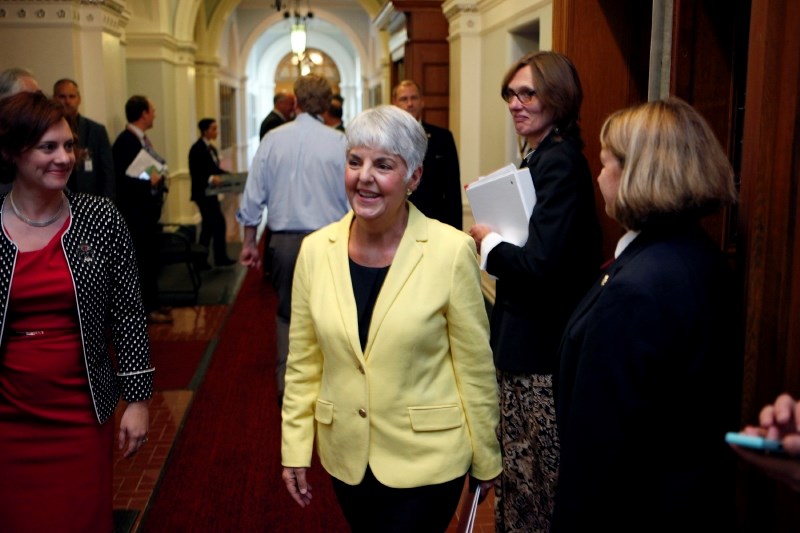The B.C. government will raise taxes on corporations and high-income earners to help pay for new spending on education, affordable housing and the ongoing overdose crisis, Finance Minister Carole James announced in a budget update Monday.
James said B.C.’s economy continues to perform better than expected and that it’s past time that all British Columbians shared in the rewards.
“A budget should benefit the people of our province, not just a few at the top,” she told the B.C. legislature. “That’s why we’re committed to making choices that benefit everyone.”
The budget increases the corporate tax rate to 12 per cent from 11, while raising the tax rate on income above $150,000 to 16.8 per cent from 14.7.
“We believe those at the top can pay a little bit more to be able to contribute to the services and programs that need to be provided for all British Columbians and that benefit all British Columbians,” she said.
In addition, the NDP will increase the carbon tax by $5 per tonne every year for four years, while ending the requirement that the tax be revenue neutral. The first increase takes effect April 1, 2018 and the tax will rise to $50 a tonne by 2021.
The government said it will use the carbon tax money to support families and invest in programs that reduce emissions.
James said the additional tax money, combined with the revenue from B.C.’s flourishing economy, will be used to increase spending on key programs by $421 million this year, while still producing a surplus of $246 million.
The new spending includes:
• $137 million for education to deal with the impact of a Supreme Court of Canada decision that restored public school class size limits and staffing ratios.
• $40 million to handle enrolment growth and other pressures in the kindergarten to Grade 12 education system.
• $67 million to help health officials and law enforcement tackle the fentanyl overdose crisis.
• $14 million to tackle social assistance caseloads.
• $1 million as a first step to restoring the $2 million budget of the University of B.C.’s Therapeutics Initiative which provides independent advice on new drugs being considered for the Pharmacare program.
• $1 million to increase the budget of the Residential Tenancy Branch
The budget commits to spending $208 million over four years to build about 1,700 units of affordable rental housing
The government will invest a further $291 million over two years to build 2,000 new modular housing units for people who are homeless, and spend $172 million over three years to operate them.
In addition, the budget commits to cutting medical services plan premiums in half for all British Columbians. The previous Liberal government had pledged to cut premiums by 50 per cent for families earning less than $120,000, but James said that plan was “unworkable” and that it was easier to cut the fees across the board.
Liberal finance critic Shirley Bond chastised the NDP for raising taxes, while offering no plan to grow the economy. She noted that the budget made no mention of the NDP promises to bring in $10-a-day childcare and provide a $400 annual renters’ rebate.
“I think it’s a lot easier to make a promise than it is to deliver it,” she said. “What we are very concerned about is the lack of demonstrable plan that is going to attract investment, create jobs and grow the economy which is required to pay for those promises.”
James said government remains committed to working towards $10-a-day daycare and the $400-a-year renters’ rebate.
But she said the government didn’t have time to act on all its promises given the delay in the transfer of power from the Liberals to the NDP following a confidence vote in June.
“You can’t turn back the clock on 16 years overnight,” she said, adding that the NDP government will continue working on its commitments in the lead-up to a full budget in February.
B.C. Green Party Leader Andrew Weaver said he was “thrilled” by the government’s decision to omit $10-a-day childcare and the $400 renters’ rebate. He said the move shows the NDP is willing to work on the issues with the Greens, who favour a different approach on both issues.
“There’s all sorts of negotiations that will happen,” he said.
Teri Mooring, vice-president of the B.C. Teachers’ Federation, said the money for education represented a “good start” for a system hard hit by the previous Liberal government. “There’s been 16 years of under-funding and that’s not going to be changed overnight and we recognize that.”
Jock Finlayson of the B.C. Business Council called the government’s fiscal plan “reasonable” and said the promised tax hikes came as no surprise. “We do have concerns about the cumulative effect of higher corporate income taxes, four years of fairly steep increases in the carbon tax in tandem with ongoing upward pressure on the cost of electricity, plus what’s happening at the federal level where various costs are going up, too,” he said.
“So that is a concern and it’s not something B.C. can solve in one budget, but it’s something they really need to pay more attention to.”
B.C. Federation of Labour president Irene Lanzinger applauded the government’s moves to make life more affordable for working families.
“There’s housing money which is very important in this expensive province and there’s an increase in social assistance rates which is incredibly important for addressing poverty,” she said.
Iain Black, president of Greater Vancouver Board of Trade and a former Liberal MLA, praised the improvements to the social safety net, but questioned where the NDP government will find the money to pay for its childcare and renters’ rebate promises. “They’ve used up all the money that’s out there, that’s on the table at the moment with this budget update,” he said. “Going into February, if they want to fulfill some of those very, very expensive items … they’re going to have to find the dough.”
lkines@timescolonist.com



